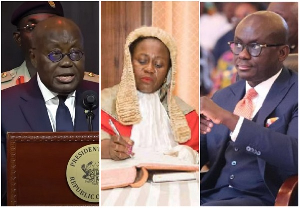Opinions of Thursday, 23 July 2015
Columnist: Hinneh, Samuel
‘Tax inspectors without borders’ to bolster domestic revenues in africa
By Samuel Hinneh
A new initiative designed by the developed world seeks to assist developing countries, particularly Africa to undertake collection of domestic revenues in an efficient and effective manner.
The Organisation for Economic Corporation and Development (OECD) and the United Nations Development Programme (UNDP) initiative will help will help countries to mobilise much-needed domestic revenues in support of the post-2015 sustainable development agenda by strengthening their tax audit capacities.
The Tax Inspectors Without Borders (TIWB) project will facilitate targeted tax audit assistance in developing countries worldwide. Tax audit experts will work alongside local officials of developing country tax administrations to help strengthen tax audit capacities, including issues concerning international tax matters.
The project was launched at the Third International Conference on Financing for Development in Addis Ababa, Ethiopia, from July 13-16, 2015.
A number of pilot projects and international tax workshops are already underway, including in Albania, Ghana and Senegal. Evidence gathered from real time cases in Colombia indicate a significant increase in tax revenue, from US$3.3 million in 2011 to US$33.2 million in 2014, courtesy of tax audit advice and guidance.
“The challenges faced by developing countries are being acknowledged internationally and we are delighted to mobilise the best experts worldwide in a practical contribution to domestic resource mobilisation,” OECD Secretary-General Angel Gurría said during a launch event in Addis Ababa.
“The new partnership between the OECD and UNDP on Tax Inspectors Without Borders will significantly extend the global reach of existing efforts to build audit capacity while sending a strong message of international support to developing countries,” Gurría explained.
"Effective domestic resource mobilisation is at the core of financing for sustainable development, but efforts to raise domestic resources are often constrained by tax evasion and avoidance, and by illicit financial flows,” said UNDP Administrator Helen Clark.
“The Tax Inspectors Without Borders programme is an innovative and practical way of supporting developing countries to mobilise more domestic resources for development. With its country level presence and local knowledge, UNDP is well-placed to partner with the OECD and the best audit experts to scale-up this important work. TIWB can support countries to realise the post-2015 agenda," Helen Clark said.
Oxfam’s tax policy advisor, Alison Holder says "Oxfam welcomes this initiative to help build the capacity of Developing Countries tax administrations. Less than 1 per cent of total aid budget is dedicated to support domestic resource mobilisation yet fairer and progressive tax systems are vital to reduce poverty and inequality.
Alison said developing countries are not claiming the tax revenues they are entitled to because of a broken international tax system. "This system allows multinational companies to cheat poor nations out of billions of dollars in taxes. Despite this, rich countries, led by the OECD, have denied them an equal say at the international negotiation table on new global tax rules," Alison added.
"There is a need for a truly inclusive global tax body where all countries can participate on equal footing to negotiate global tax rules. Countries have been blocking the creation of such a new intergovernmental tax body in Addis," said the tax policy advisor.
According to Alvin Mosioma, executive director of the Tax Justice Network Africa there is the need to also recognise that capacity alone will not solve the problem. "Tax havens act as a breeding ground for unscrupulous activities by multinational companies, so as long as we allow it to exist no amount of capacity building will be able to help African countries to stop the breeding of resources from the countries,” he says.
A dedicated central organising unit, the TIWB Secretariat, supported by an oversight board of stakeholders, will operate as a clearing house to match the demand for auditing assistance with appropriate expertise. The Secretariat, composed of OECD and UNDP staff and based at the OECD in Paris, will facilitate full-time or periodic deployment of experts.












